www.youthsprouts.blogspot.com
 Wireless hotspots are spreading across the world's cities, with blanket wi-fi zones now being rolled out in many city centres. Operators are promising wireless surfing at the touch of a button from the park, the bus or the street corner. So what does the wireless future have to offer and will it live up to the hype?
Wireless hotspots are spreading across the world's cities, with blanket wi-fi zones now being rolled out in many city centres. Operators are promising wireless surfing at the touch of a button from the park, the bus or the street corner. So what does the wireless future have to offer and will it live up to the hype?
What is wi-fi?
Wi-fi is the acronym for Wireless Fidelity, essentially a set of standards for transmitting data over a wireless network.
Wi-fi allows you to connect to the net at broadband speeds without cables, as long as you have the right equipment and, in most cases, a regular internet service provider and a wi-fi account.
To understand the technology behind wi-fi, imagine using a walkie-talkie. Your voice is picked up by a microphone, encoded onto a radio frequency and transmitted with the antenna to another walkie-talkie, which decodes your voice.
Wi-fi works in broadly in the same way, but using a better radio that is capable of handling a lot more data per second.
| HOW DOES WI-FI WORK?  1: Wi-fi uses antennas around which wi-fi "hotspots" are created. The hotspots are outlets equipped to receive the radiowaves that power wireless networking. Until recently, wi-fi has been confined to more than 10,000 hot-spots in cafes, bars and airport lounges. But various projects are under way to set up city-wide zones, where a series of antennas are installed in the streets, on lampposts or street signs. The hotspots around them together create a much wider area of coverage. Norwich has a mesh network which links each lamppost antenna to the next creating a seamless wi-fi hotspot around the centre of the city. 2: The source internet connection is provided by a PC or server to which the antennas are connected either wirelessly or via a cable. 3: Some mobile phones and personal digital assistants (PDA) now have wi-fi chips installed. With mobile phones, this means conventional networks can be bypassed and inexpensive long-distance calls made over the web (using Voice over Internet Protocol, VoIP). 4: Many laptops and handheld computers now come with built-in wi-fi connectivity; it is also possible to add wi-fi to your computer with a special card that plugs into a port on your laptop. |
How do I use a giant wi-fi zone?
In the UK, there are already more than 10,000 wi-fi hotspots in public places such as restaurants, hotels, cafes, libraries and airports.
Wi-fi-enabled laptops and phones can be set up to connect to these hotspots automatically; usage is generally paid through a credit card at a login page on a web browser. Frequent users may even have accounts with service providers such as T-Mobile, BT Openzone, O2, SkypeZones and Nintendo wi-fi.
Will it catch on?
So far, wi-fi has been a service that is most useful for business people who need to work on the move; but operators want to make it available to all.
However, some analysts warn that wi-fi could be the "next dotcom crash", mainly because of patchy hotspot coverage, lack of enabled hardware and uncertainty over how to make money.
There are still a few big challenges ahead for wi-fi. Finalising interoperability and standards is one, and the concern over security is another.
Just because there are more than 10,000 wi-fi hotspots in the UK does not mean that a pass to use one means you can use all of them. Currently wi-fi hotspots are divided by who controls them.
In Norwich the local authority and regional development agency are pioneering a free wi-fi service. This model could catch on, if successful. More than 3,000 connections are being made to the city's wi-fi network each week
Logging on to the internet via wi-fi in different locations brings the risk (just as it does at home or in the office) of your computer being infected by computer viruses and worms. Experts advise you to install security software and update it regularly.
Who stands to profit?
Some critics argue that wireless hotspots can be a rip-off - the price of installing a wireless router in, say, a coffee shop, involves a one-off cost of a few hundred pounds but customers may be charged upwards of £5 an hour.
Users of the new city-wide wi-fi networks will be required to pay access charges to an account provider, such as BT Openzone or T-Mobile.
The revenues will be shared between the owners of the street furniture on which the equipment is installed (usually local councils), wi-fi hotspot suppliers and the internet service providers.
__

 __
__






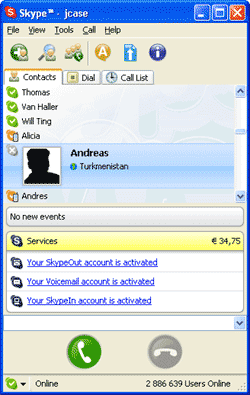 Skype is a proprietary peer-to-peer internet telephony (VoIP) network, founded by Niklas Zennström and Janus Friis, the creators of KaZaA. The Skype Group is headquartered in Luxembourg with offices also in London and Tallinn.
The system has a generally favorable reputation for working across different types of network connections (including firewalls and NAT) because voice packets are routed by the combined users of the free desktop software application.
The basic computer-to-computer service allows users to speak, to send instant messages or to send files to one another from their computers via the Internet at no cost. Conferences of up to five users are supported.
SkypeOut is a paid feature of the Skype internet telephony service, which allows Skype users to call virtually any non-computer-based landline or mobile telephone in the world.
SkypeIn allows Skype users to receive calls on their computers dialed by regular phone subscribers to regular phone numbers. Beta released on March 10, 2005, SkypeIn permits users to subscribe to numbers in UK, USA, France, Hong Kong, Denmark, Finland, Norway, Sweden, Estonia and Poland. Cost is €30 for a 12-month subscription, or €10 for a three-month subscription. Users can have multiple SkypeIn phone numbers bound to the same account (a separate subscription is required for each). For example, someone who does business in both San Francisco and Helsinki could create a local telephone number in each city, and callers from those locations would pay cheap or free local rates.
On September 12, 2005 eBay announced its plan to acquire the company for $US 2.6 billion, plus an additional 1.5 billion in rewards if goals are met by 2008. eBay will pay half in cash and half in stock options.
Skype is a proprietary peer-to-peer internet telephony (VoIP) network, founded by Niklas Zennström and Janus Friis, the creators of KaZaA. The Skype Group is headquartered in Luxembourg with offices also in London and Tallinn.
The system has a generally favorable reputation for working across different types of network connections (including firewalls and NAT) because voice packets are routed by the combined users of the free desktop software application.
The basic computer-to-computer service allows users to speak, to send instant messages or to send files to one another from their computers via the Internet at no cost. Conferences of up to five users are supported.
SkypeOut is a paid feature of the Skype internet telephony service, which allows Skype users to call virtually any non-computer-based landline or mobile telephone in the world.
SkypeIn allows Skype users to receive calls on their computers dialed by regular phone subscribers to regular phone numbers. Beta released on March 10, 2005, SkypeIn permits users to subscribe to numbers in UK, USA, France, Hong Kong, Denmark, Finland, Norway, Sweden, Estonia and Poland. Cost is €30 for a 12-month subscription, or €10 for a three-month subscription. Users can have multiple SkypeIn phone numbers bound to the same account (a separate subscription is required for each). For example, someone who does business in both San Francisco and Helsinki could create a local telephone number in each city, and callers from those locations would pay cheap or free local rates.
On September 12, 2005 eBay announced its plan to acquire the company for $US 2.6 billion, plus an additional 1.5 billion in rewards if goals are met by 2008. eBay will pay half in cash and half in stock options.
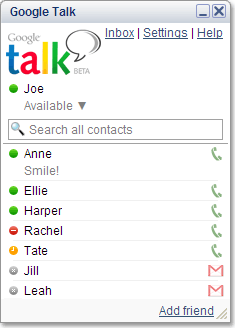 Google Talk is a service developed by Google for instant messaging (IM) that also allows for PC to PC audio conversations. Google Talk beta was released on August 24, 2005 and consists of both a service and a client used to connect to the service. Unlike some other instant messaging services, Google Talk uses an open protocol (Jabber) for the IM part and it encourages the use of clients other than their own in connecting to the Google Talk service.
As of the launch date, the Google Talk client is available only for Windows (2000, XP, Server 2003); users of other operating systems are provided with instructions for various popular Jabber clients, such as Psi or Miranda IM for Microsoft Windows and below, iChat or Adium for Mac OS X and Gaim for Linux. However, any program capable of using the Jabber protocol is sufficient, although the voice over IP service only works with the Google client. Google claims they will release a specification for the voice extension in the near future.
Google Talk is a service developed by Google for instant messaging (IM) that also allows for PC to PC audio conversations. Google Talk beta was released on August 24, 2005 and consists of both a service and a client used to connect to the service. Unlike some other instant messaging services, Google Talk uses an open protocol (Jabber) for the IM part and it encourages the use of clients other than their own in connecting to the Google Talk service.
As of the launch date, the Google Talk client is available only for Windows (2000, XP, Server 2003); users of other operating systems are provided with instructions for various popular Jabber clients, such as Psi or Miranda IM for Microsoft Windows and below, iChat or Adium for Mac OS X and Gaim for Linux. However, any program capable of using the Jabber protocol is sufficient, although the voice over IP service only works with the Google client. Google claims they will release a specification for the voice extension in the near future.
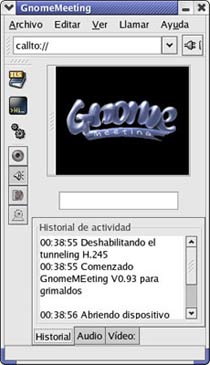 GnomeMeeting is an open source VoIP and video conferencing application for GNOME. It is based on the OpenH323 library and primarily uses the H.323 protocol, although support for SIP is in development. It supports many audio and video codecs, and is interoperable with Microsoft NetMeeting.
GnomeMeeting was written by Damien Sandras in order to graduate from the Université catholique de Louvain.
GnomeMeeting is an open source VoIP and video conferencing application for GNOME. It is based on the OpenH323 library and primarily uses the H.323 protocol, although support for SIP is in development. It supports many audio and video codecs, and is interoperable with Microsoft NetMeeting.
GnomeMeeting was written by Damien Sandras in order to graduate from the Université catholique de Louvain.
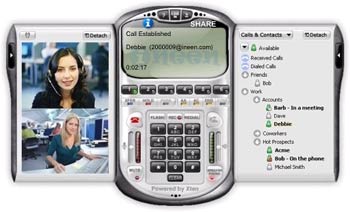 ineen is a VoIP network that allows free IP Telephony calls. ineen has a laundry list of features which include voice, video, conferencing, distributed conferencing, speakerphone, call transfer, and instant messaging. Unlike other software, ineen took the approach of an interface that models a normal phone.
The software is available for Windows, Mac OS X, and Pocket PC.
ineen is a VoIP network that allows free IP Telephony calls. ineen has a laundry list of features which include voice, video, conferencing, distributed conferencing, speakerphone, call transfer, and instant messaging. Unlike other software, ineen took the approach of an interface that models a normal phone.
The software is available for Windows, Mac OS X, and Pocket PC.




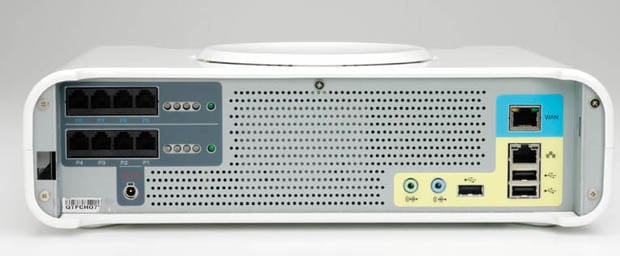 Today,
Today, 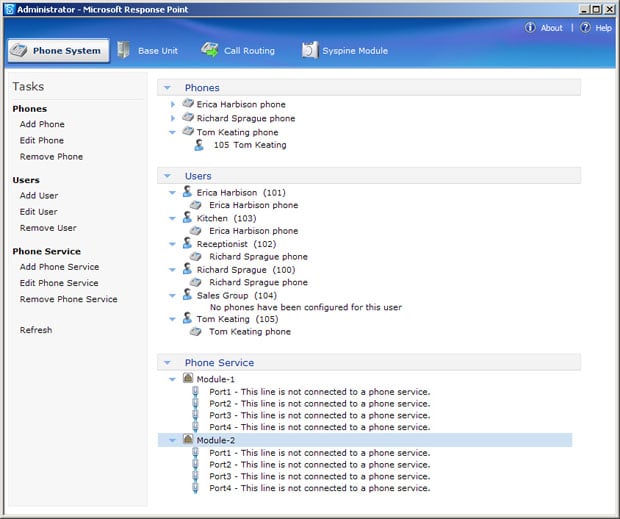 Lastly, check out my
Lastly, check out my 






